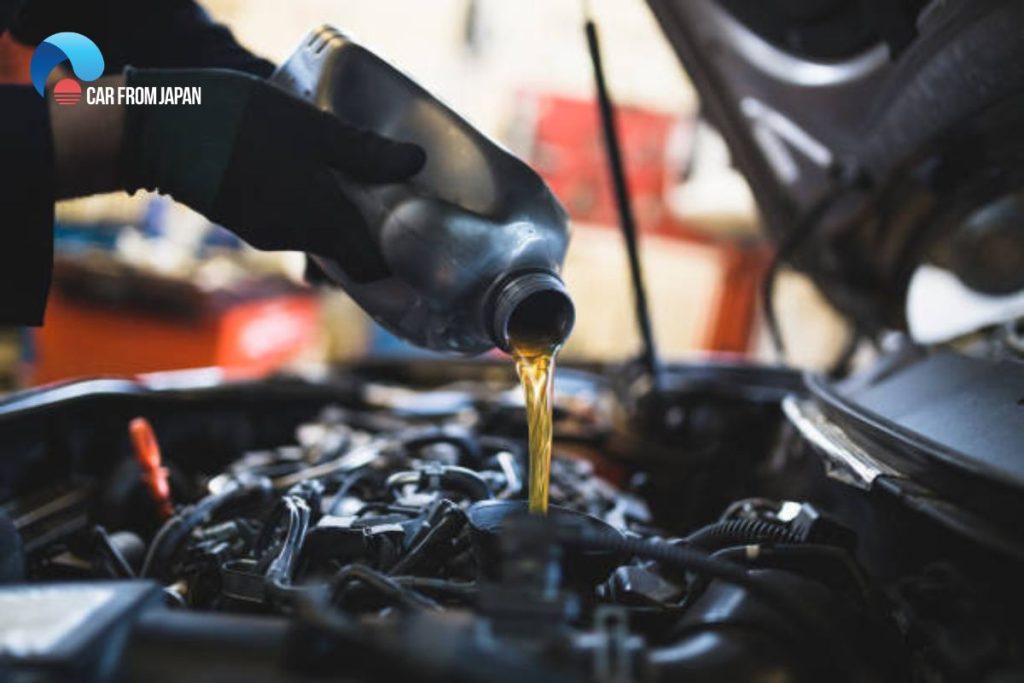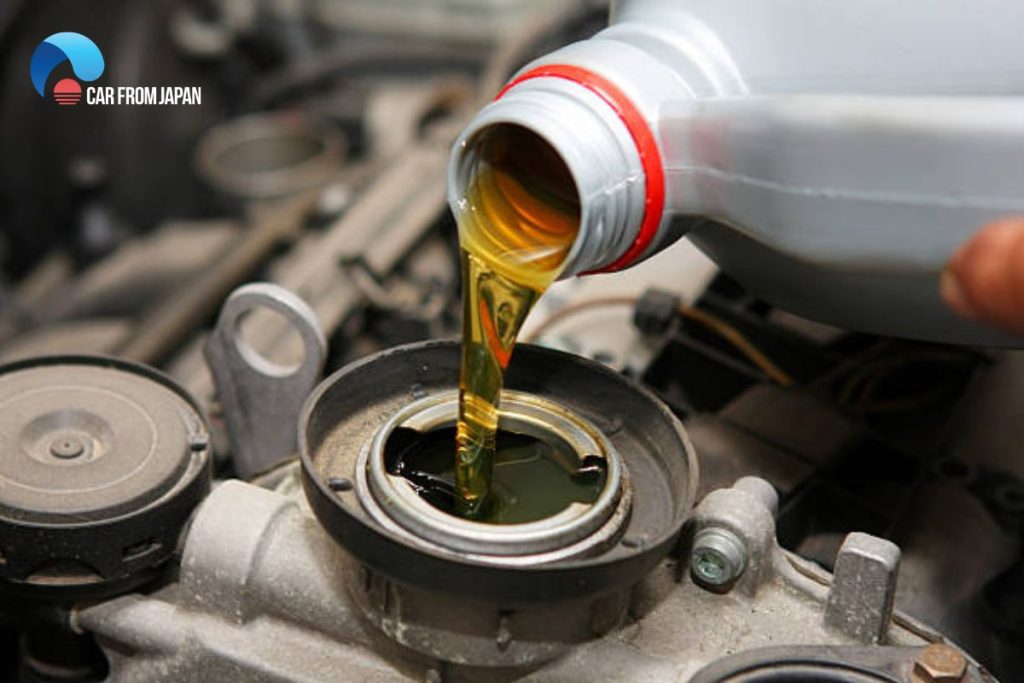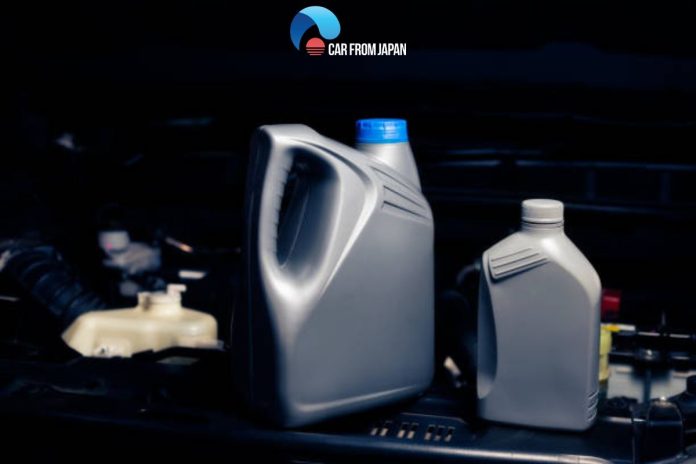There are hundreds of oils but 10w30 and the 5w20 are the most common of all. The 10w30 type is the thicker one and 5w20 is the thinner. At this point, you might be wondering can I use 10w30 instead of 5w20?
Let’s explore which oil type is suitable for your vehicle with Car From Japan right away!
Contents
What Is 5W20 Oil Used For?
5W20 oil is a multi-grade motor oil designed to provide optimal lubrication and engine protection across a wide range of temperatures. The “5W” indicates its excellent cold-start performance, allowing for smooth engine operation even in frigid conditions. The “20” represents its viscosity at operating temperature, ensuring adequate lubrication and protection against wear and tear when the engine is hot.
The 5w20 conventional oil is used in cold weather when a low-viscosity oil is required to start a cold engine. High viscosity engine oil cannot be used in cold weather or snowfall. You cannot start the machine using 5w30 synthetic oil.
The 5w20 engine oil, on the other hand, is an excellent choice for cold weather. Assume you own a conventional car and must drive it in chilly weather. So it’s not like you have to use the 5w30 in all conditions, but you can’t use it in the heat.
What Is 10W30 Oil Used For?
10W30 oil is a versatile choice often recommended for older vehicles, trucks, and SUVs with larger engines. Its slightly higher viscosity compared to lighter grades like 5W20 provides enhanced protection in high-stress conditions and high-temperature environments.

While it may not offer the same fuel efficiency benefits as thinner oils, 10W30 strikes a balance between lubrication, protection, and performance for a wide range of applications.
10w30 is used in engines with a greater viscosity. You should use 10w30 if your car engine demands a high viscosity.
Low viscosity oil cannot be used since the heavier oil will manage the high-mileage engine. However, no low viscosity oil may be used in that engine.
Notably, all heavy load engines have greater viscosity oil needs. In that instance, 10w30 engine oil is required for optimal engine performance.
Furthermore, if your machine requires 10 viscosity at low temperatures and 30 viscosity in high temperatures, you must use 10w30 synthetic oil.
Can I Use 10w30 Instead of 5w20: Things To Notice
Car manufacturers provide oil specifications for each model and there is a reason for it. The motor oil is categorized according to its viscosity. Whether the oil is thicker or extra thinner, it specifies the type of engine it is suitable for.
Of course, your oil selection affects the performance of an engine. Some parts of the engine are built to work well with a specific type of oil. So, check out what would happen if you use 10w30 instead of 5w20.
External temperature
Before you think about whether can I use 10w30 instead of 5w20, it is vital to know which oil type is suitable according to the environment. The W is the standard that specifies winters.
The lower the number before W, the thinner the oil viscosity. Moreover, many of us know that thinner oil is easy to ignite even at a temperature below negative. Therefore, if the temperature is below zeros, use 5w20 oil.
In the same case, 10w30 oil can take hours to ignite in winter. So, it’s better to choose the oil type wisely depending on the weather.

Effect on components
Parts like the rod and main bearing help to put up with a load on the rotating shaft. These parts normally do well with thicker oil as it leads to the stronger film.
The thinner oil (5w20) will enable journal bears to support moving components to bear weight and will wear out eventually.
Some other parts like cooling nozzles run efficiently with thinner oil. In any case, you put thicker oil; the nozzles will experience a reduced flow. It is preferable to use effective maintenance tips in such cases or simply contact the nearby mechanic.
Fuel economy & engine
If you wonder whether can I use 10w30 instead of 5w20, probably, only a few changes are discoverable especially when the engine is about to wear out and is old. Moreover, one of the benefits of thinner oil would be to ignite quickly.
Therefore, fewer efforts are required to pump the fuel, which minimizes the fuel economy. On the other hand, the life of an engine may decrease due to uneven oil circulation in the region of the piston.
FAQs
What can happen to your car when you use the wrong type of oil?
Using the no-fit engine oil might have major effects for your vehicle.
– It has the potential to harm engines, diminish fuel economy, and raise needless emissions.
– It will result in poor engine performance since it will be unable to adequately lubricate your car’s parts. This might cause your car to wear down faster, resulting in pricey repairs.
– Furthermore, using the wrong type of oil can damage components such as seals and gaskets, increasing maintenance expenses.
– Overheating can also be caused by incorrect engine oil use. Using a heavier oil than recommended can result in reduced flow and the oil’s inability to manage temperature.
– A thicker or more viscous oil will require more energy to pump, resulting in greater fuel usage. Your engine will consume more gasoline to overcome the increased resistance of moving components.
What oil can you use for your car instead of 5W-20?
In most circumstances, 0W-20 is an adequate alternative for 5W-20. At operating temperatures, both products are 20-weight motor oils. However, if your car is still under warranty, you may be able to use 0W-20.
What happens if you accidentally use 5w30 instead of 5w20?
Most automotive engines are designed to run 5w20 oil because it flows well when the engine reaches its operating temperature of 212 degrees.
If 5w30 oil is used at this time, the engine will encounter much increased resistance, which is not desirable.
Is 5w30 thicker than 5w20 oil?
The lower “20” number indicates that the 5W-20 will stay somewhat thinner at working temperature, whereas the 5W-30 will offer a little thicker lubricating coating.
What type of vehicle is suitable for 10W-30 oil?
Experts recommend 10W-30 for all current gasoline-powered vehicles, including the high-performance turbocharged, supercharged, multi-valve fuel injected engines used in passenger cars, SUVs, light vans, and light trucks.
What engine oil is good for hot weather?
Most OEMs still recommend multi-grade oils in tropical conditions, such as SAE 15W-40, since the lubricant flows quicker through the engine than a pure SAE 40, even at higher ambient temperatures.
Final Words
So, can you swap 10W30 for 5W20? The short answer is: it’s not recommended. While both are multi-grade oils, their viscosity differences mean they’re not always interchangeable.
10W30 is thicker and protects older engines with its sealing capability. 5W20 is a thinner multi-grade oil that is pertinent for quick starts in the lowest temperatures.
To protect your car from internal damages, it is beneficial to use only specified engine oil by the manufacturers. Ultimately, your vehicle’s manufacturer knows best. Always consult your owner’s manual for the recommended oil viscosity.




It appears that if you have a car that requires 5W20 and you use this , then you have done as
the manufacture has required. But your car gets older and the oil being thin does not fully support
your rods and bearings if this being true your engine will wear out quicker. Would it not be reasonable
that your car at a certain mileage the viscosity could be changed to forestall the failure of the engine
even though nothing last forever .
My car 2006 Mitsubishi galant 4 cylinders has 215095 millage, which is of synthetic oil can I use??
Yes use 10w30 if your car is like an 06 Ford that has over 130000 miles. It will help keep things sealed. Highly recommended ask any good mechanic, especially diesel mechanics they know it all.
0w-20 and 5w-20 oils are WINTER USE ONLY oils and should NEVER be used in ANY car above 60 degrees F.
Using these ultra thin oils WILL cause oil burning and bearing damage